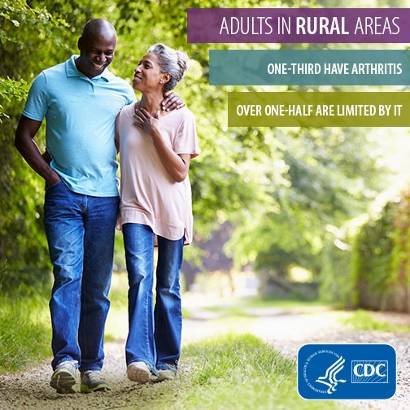
Research over the past several decades has consistently shown the disparities that exist between rural and urban communities across the United States. Residents of rural communities, especially minority and low-income residents, tend to report higher prevalence of chronic conditions (for example arthritis, diabetes and heart disease), poorer health, and little to no physical activity compared to residents of urban communities.
This is due to a variety of demographic, social, environmental and economic factors such as shortages of healthcare professionals in rural areas, less access to quality healthcare and community services, and lack of funding for quality infrastructure (for example pedestrian sidewalks, crosswalks, parks and trails).
According to a report released last week by the Centers for Disease and Control Prevention (CDC), Prevalence of Arthritis and Arthritis-Attributable Activity Limitation by Urban-Rural County Classification- United States, 2015:
Access to quality physical activity and self-management education programs for rural residents with arthritis and other forms of chronic conditions is one way in which the disparity in arthritis prevalence between rural and urban communities can be addressed. Whether an individual has osteoarthritis, rheumatoid arthritis, lupus or gout, participation in evidence-based programs (such as Walk With Ease, Active Living Every Day, Fit and Strong! and Tai Chi for Arthritis) can help decrease the pain associated with the different forms of arthritis. These programs allow individuals with arthritis to engage in physical activity (walking, swimming, etc.,), develop the necessary skills to manage their conditions, as well as socialize and establish support groups with other adults with arthritis in their communities. These evidence-based programs not only improve physical functionality, they also provide proven actions to manage fatigue, anxiety and depression.
Local park and recreation departments that are present in many rural communities across the country have the opportunity to impact the health, wellness and overall quality of life of their residents, and offer programs and services that are otherwise lacking in their communities.
“The Walk With Ease program is an excellent program that is beneficial to my rural community,” said Tenia Brown Fillilove, Health Coordinator for Tunica Parks and Recreation in Tunica, Mississippi. “It provides residents with an opportunity to walk safely. One of our participants that suffers from rheumatoid arthritis stated that since coming to the class she has noticed a significant decrease in her aches and pain, has been able to walk two miles around our track, enjoy gardening, and has even lost a little weight.”
Many other park and recreation agencies located in rural communities such as Freeport Parks and Recreation in Freeport, Florida; Mount Sterling-Montgomery County Parks and Recreation in Mount Sterling, Kentucky; Chanute Recreation Commission in Chanute, Kansas; Sullivan Parks & Recreation in Chittenango, New York; and Village of Pleasant Prairie Parks and Recreation in Pleasant Prairie, Wisconsin have all taken on the commitment and challenge to offer evidence-based physical activity programs in their communities.
To learn how you might get involved and become an agency implementing evidence-based physical activity programs (rural, suburban or urban), visit NRPA’s Arthritis Interventions webpage and check out the Walk With Ease: Ingredients for Success and Active Living Every Day Best Practices Guide.
Lesha Spencer-Brown is NRPA’s Arthritis Interventions Program Manager. Feel free to reach out to her with any questions about arthritis interventions programming.


